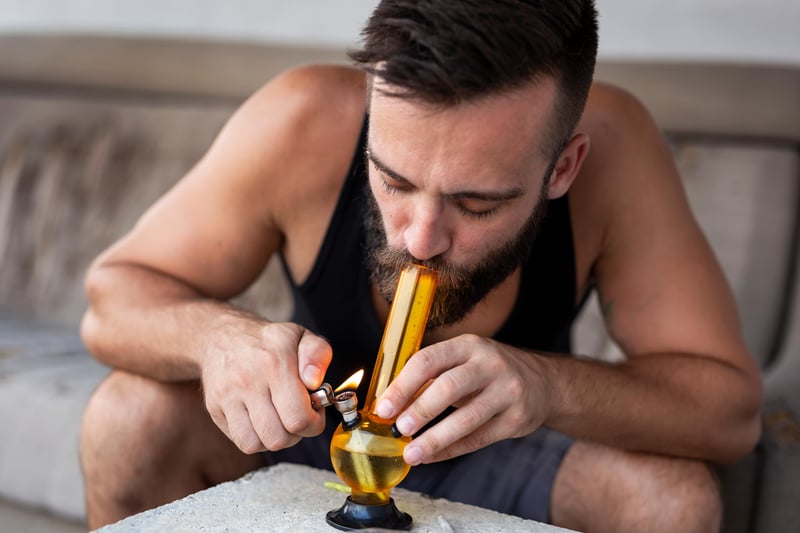Get Healthy!

- Dennis Thompson
- Posted May 10, 2023
Marijuana Use Implicated in Almost a Third of Cases of Schizophrenia in Young Men
Marijuana appears to significantly increase young men's risk of developing schizophrenia, a new study suggests.
Up to 30% of schizophrenia cases among men aged 21 to 30 are related to heavy and problematic use of marijuana, according to the findings.
The researchers also found a tripled overall risk of schizophrenia linked to cannabis use in young men compared to women: Around 15% of cases of schizophrenia in men aged 16 to 49 might have been avoided in 2021 by preventing cannabis use, in contrast to just 4% among women in that age range.
"The clear message is that cannabis may not be the innocent and risk-free substance that so many people believe,"said co-researcher Dr. Wilson Compton, deputy director of the U.S. National Institute on Drug Abuse.
The new study, published May 4 in the journal Psychological Medicine, involved data from more than 6.9 million people in Denmark who were aged 16 to 49 at some point between 1972 and 2021.
The researchers tracked reported cannabis use and diagnoses of schizophrenia, a mental disorder in which people lose touch with reality. Patients suffer from psychotic symptoms like hallucinations, delusions and disordered thoughts.
The study builds off of prior research which had found that as rates of cannabis use disorder increased in the Danish population, there was a parallel increase in schizophrenia, Compton said.
Cannabis use disorder is "defined as people who use cannabis regularly and generally quite heavily,"Compton said.
"But more than just the pattern of use, it includes people that have found that they organize their life around cannabis, that they spend more time than they can afford to on it, that they continue to use cannabis even though it's causing them either physical or mental problems, that it's causing them social problems,"Compton added.
Men are more likely than women to develop schizophrenia, and they're also more likely to overindulge in marijuana, Compton noted.
Based on that, the researchers theorized that cannabis use disorder could further increase a young man's risk of schizophrenia.
"What we showed is that males are particularly vulnerable to this association, with a strong association of cannabis use disorder and schizophrenia and higher rates in males than females,"Compton said.
Problematic cannabis use might be putting pressure on the developing brains of young men who already have a higher genetic risk for the mental disorder, he speculated.
That sounds right to Pat Aussem, associate vice president of consumer clinical content development for the Partnership to End Addiction, in New York City.
"The brain continues to develop until around age 25, and cannabis use during this period may interfere with this process, particularly in areas of the brain involved in cognition and emotion regulation,"Aussem said. "This may increase the risk of developing psychiatric disorders such as schizophrenia."
The theory is that THC -- the intoxicating compound in weed -- works by binding to brain receptors and creating altered ways of thinking and perceiving the world, she explained.
"THC can trigger psychotic symptoms such as hallucinations and delusions, which are a hallmark of schizophrenia,"Aussem said. "Cannabis also increases the release of dopamine in the brain's reward system, which can increase feelings of well-being and pleasure. Research suggests there is a link between dopamine levels, psychosis and schizophrenia."
However, other studies have found no relationship between marijuana and schizophrenia, said Paul Armentano, deputy director of NORML, an advocacy group promoting the reform of cannabis laws and regulations.
"While claims regarding cannabis and mental illness often make headlines, there is also an abundance of studies, many published just within the past few months, disputing these allegations,"Armentano said. "In particular, two newly published [but largely ignored] studies failed to identify any increased risk of psychosis-related outcomes in states where cannabis is legal."
The relationship observed in the new study also might be the other way round, Armentano added -- people with psychotic illnesses might be more likely to self-medicate with cannabis and other controlled substances.
"Therefore, it remains premature at best and sensational at worst to claim that a definitive causal relationship exists between cannabis use and the onset of psychiatric disorders, particularly among those not predisposed to these conditions,"Armentano said.
"Further, the fact that cannabis has been used by various populations for decades at disparate rates, yet rates of psychosis and other psychiatric disorders have generally remained static over this same period of time, strongly argues against this assertion,"he added.
Nevertheless, Compton said parents would do best to urge their kids to avoid using any substances.
"Keeping teens' brains healthy by avoiding use of tobacco, alcohol, cannabis and other substances is part of raising healthy children,"Compton said. "We've also learned that those who are most at risk of starting substance use early are those that have a number of problematic issues in their background. So protecting children from serious trauma and providing a loving, nurturing environment very early in life, it turns out, can be one of the most important things to reduce the onset of substance use."
More information
The U.S. National Institute of Mental Health has more about schizophrenia.
SOURCES: Wilson Compton, MD, deputy director, U.S. National Institute on Drug Abuse; Pat Aussem, associate vice president, consumer clinical content development, Partnership to End Addiction, New York City; Paul Armentano, deputy director, NORML, Washington, D.C.; Psychological Medicine, May 4, 2023




